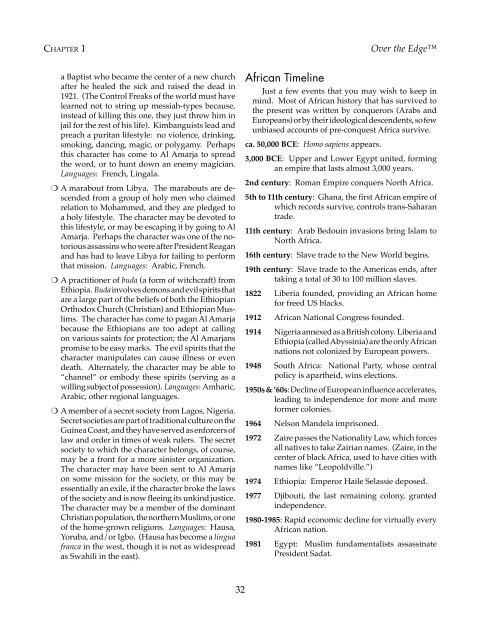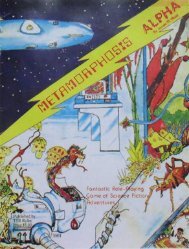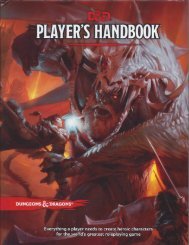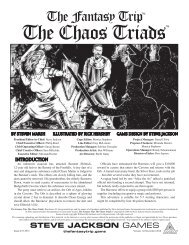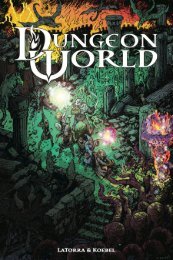Over_the_Edge_Players'_Survival_Guide
Player's guide to Over the Edge rpg
Player's guide to Over the Edge rpg
Create successful ePaper yourself
Turn your PDF publications into a flip-book with our unique Google optimized e-Paper software.
CHAPTER 1<br />
<strong>Over</strong> <strong>the</strong> <strong>Edge</strong><br />
a Baptist who became <strong>the</strong> center of a new church<br />
after he healed <strong>the</strong> sick and raised <strong>the</strong> dead in<br />
1921. (The Control Freaks of <strong>the</strong> world must have<br />
learned not to string up messiah-types because,<br />
instead of killing this one, <strong>the</strong>y just threw him in<br />
jail for <strong>the</strong> rest of his life). Kimbanguists lead and<br />
preach a puritan lifestyle: no violence, drinking,<br />
smoking, dancing, magic, or polygamy. Perhaps<br />
this character has come to Al Amarja to spread<br />
<strong>the</strong> word, or to hunt down an enemy magician.<br />
Languages: French, Lingala.<br />
A marabout from Libya. The marabouts are descended<br />
from a group of holy men who claimed<br />
relation to Mohammed, and <strong>the</strong>y are pledged to<br />
a holy lifestyle. The character may be devoted to<br />
this lifestyle, or may be escaping it by going to Al<br />
Amarja. Perhaps <strong>the</strong> character was one of <strong>the</strong> notorious<br />
assassins who were after President Reagan<br />
and has had to leave Libya for failing to perform<br />
that mission. Languages: Arabic, French.<br />
A practitioner of buda (a form of witchcraft) from<br />
Ethiopia. Buda involves demons and evil spirits that<br />
are a large part of <strong>the</strong> beliefs of both <strong>the</strong> Ethiopian<br />
Orthodox Church (Christian) and Ethiopian Muslims.<br />
The character has come to pagan Al Amarja<br />
because <strong>the</strong> Ethiopians are too adept at calling<br />
on various saints for protection; <strong>the</strong> Al Amarjans<br />
promise to be easy marks. The evil spirits that <strong>the</strong><br />
character manipulates can cause illness or even<br />
death. Alternately, <strong>the</strong> character may be able to<br />
“channel” or embody <strong>the</strong>se spirits (serving as a<br />
willing subject of possession). Languages: Amharic,<br />
Arabic, o<strong>the</strong>r regional languages.<br />
A member of a secret society from Lagos, Nigeria.<br />
Secret societies are part of traditional culture on <strong>the</strong><br />
Guinea Coast, and <strong>the</strong>y have served as enforcers of<br />
law and order in times of weak rulers. The secret<br />
society to which <strong>the</strong> character belongs, of course,<br />
may be a front for a more sinister organization.<br />
The character may have been sent to Al Amarja<br />
on some mission for <strong>the</strong> society, or this may be<br />
essentially an exile, if <strong>the</strong> character broke <strong>the</strong> laws<br />
of <strong>the</strong> society and is now fleeing its unkind justice.<br />
The character may be a member of <strong>the</strong> dominant<br />
Christian population, <strong>the</strong> nor<strong>the</strong>rn Muslims, or one<br />
of <strong>the</strong> home-grown religions. Languages: Hausa,<br />
Yoruba, and/or Igbo. (Hausa has become a lingua<br />
franca in <strong>the</strong> west, though it is not as widespread<br />
as Swahili in <strong>the</strong> east).<br />
African Timeline<br />
Just a few events that you may wish to keep in<br />
mind. Most of African history that has survived to<br />
<strong>the</strong> present was written by conquerors (Arabs and<br />
Europeans) or by <strong>the</strong>ir ideological descendents, so few<br />
unbiased accounts of pre-conquest Africa survive.<br />
ca. 50,000 BCE: Homo sapiens appears.<br />
3,000 BCE: Upper and Lower Egypt united, forming<br />
an empire that lasts almost 3,000 years.<br />
2nd century: Roman Empire conquers North Africa.<br />
5th to 11th century: Ghana, <strong>the</strong> first African empire of<br />
which records survive, controls trans-Saharan<br />
trade.<br />
11th century: Arab Bedouin invasions bring Islam to<br />
North Africa.<br />
16th century: Slave trade to <strong>the</strong> New World begins.<br />
19th century: Slave trade to <strong>the</strong> Americas ends, after<br />
taking a total of 30 to 100 million slaves.<br />
1822 Liberia founded, providing an African home<br />
for freed US blacks.<br />
1912 African National Congress founded.<br />
1914 Nigeria annexed as a British colony. Liberia and<br />
Ethiopia (called Abyssinia) are <strong>the</strong> only African<br />
nations not colonized by European powers.<br />
1948 South Africa: National Party, whose central<br />
policy is apar<strong>the</strong>id, wins elections.<br />
1950s & ’60s: Decline of European influence accelerates,<br />
leading to independence for more and more<br />
former colonies.<br />
1964 Nelson Mandela imprisoned.<br />
1972 Zaire passes <strong>the</strong> Nationality Law, which forces<br />
all natives to take Zairian names. (Zaire, in <strong>the</strong><br />
center of black Africa, used to have cities with<br />
names like “Leopoldville.”)<br />
1974 Ethiopia: Emperor Haile Selassie deposed.<br />
1977 Djibouti, <strong>the</strong> last remaining colony, granted<br />
independence.<br />
1980-1985: Rapid economic decline for virtually every<br />
African nation.<br />
1981 Egypt: Muslim fundamentalists assassinate<br />
President Sadat.<br />
32


